デモクラシー 4 – 基本的なゲームプレイ ガイド
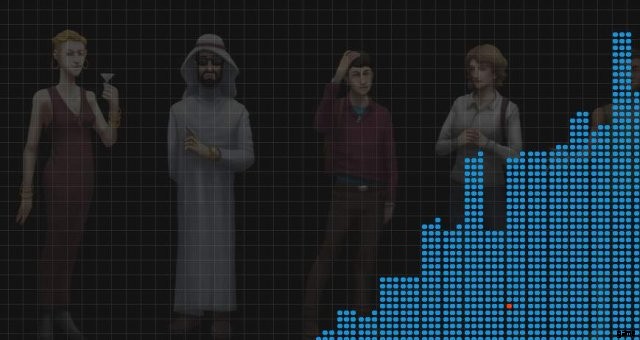
ゲーム内ヘルプと同じ、ゲームの遊び方のガイドです。
基本ガイド
メイン インターフェース
デモクラシー 4 では、現実世界の国の首相 (または大統領) の立場に置かれます。ゲームの開始時に、あなたはサーブに選ばれました。国はうまくやっているかもしれませんし、本当に混乱しているかもしれません。経済的、社会的、または他のさまざまな方法で。有権者は満足しているかもしれませんし、怒っているかもしれません。本当に重要なことは、有権者の過半数を十分に満足させ、任期の終わりに再選されるようにすることです。選択した国、および開始前に設定したオプションに応じて、限られた数または無限の期間を提供します。ゲームの各「ターン」は、1 年の四半期です。在職中の大統領としてどのように行動するかは完全にあなた次第ですが、ゲームは従来の意味で「勝つ」ことはできず、選挙または暗殺、つまりあなたの暗殺でのみ負けることに注意してください.すべての政治的キャリアは失敗に終わります。
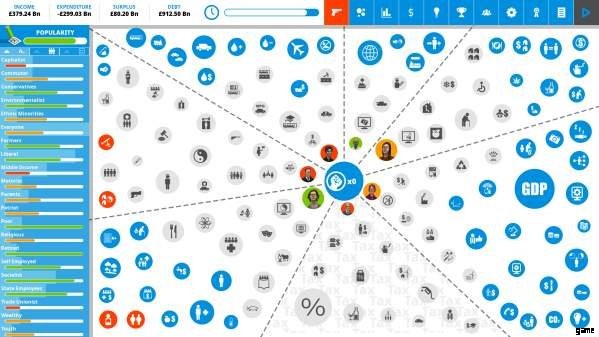
メインインターフェイスは本質的に象徴的です。言い換えれば、ナビゲートする地図や 3D 世界はなく、国のさまざまな政治的および経済的側面間の相互接続の複雑なグラフィックのみです。グラフィカル・ユーザー・インターフェース (GUI) を理解するための主な原則は、すべてが他のすべてに影響を与えることを理解することです。ゲームを理解するための鍵は、A が B に影響を与え、C が A に影響を与える方法を理解することです。政治と経済は複雑です!マウスを使用してカーソルをメイン画面のアイコンの上に置くと、これがどのように機能するかを確認できます。
これにより、アイテムと他のアイテムを結ぶ一連の線が表示されます。緑の線はプラスの効果、赤の線はマイナスの効果を示します。矢印が速く動くほど、効果が強くなります。
正負は価値判断ではなく、単なる数値であることに注意してください。失業に対するプラスの影響は、一般的に悪いことです。公害へのマイナスの影響は、一般的に良いことです。アイテムを結ぶ線の軌跡をたどることで、国内の変化の究極の原因をたどることができます。資金不足の学校は貧困につながり、貧困は犯罪につながるのかもしれません。犯罪の増加は、GDP に影響を与える観光業を減少させ、それが失業を増加させ、貧困をさらに悪化させます…など。
有権者
最終的にあなたの運命を決めるのは有権者です。デモクラシー 4 は、社会の代表的なスライスをシミュレートします。各個人は、独自の意見、政党や組織のメンバーシップ、忠誠心、独自の影響力の組み合わせを持っており、それらが集まって投票の決定を通知します。また、独自のレベルの政治的不安定性もあります。そのうちの何人かは他の人よりも早く怒ります。特に若い人はそうです。一部の人々は、他の人々よりも抗議行動やテログループに参加する傾向があります.有権者について覚えておくべき重要なことは、彼らが単なる社会経済グループのメンバーではないということです。デモクラシー 4 の誰もただの「社会主義者」ではありません。

各有権者は、リベラルまたは保守、社会主義者または資本主義者として定義され、3 つの所得グループ (低、中、富裕層) のいずれかに当てはまります。これらのグループは、スペクトル上に存在するため、すべて特別です。誰もリベラルで保守的ではありませんが、(たとえば) 非常に穏健なリベラルである可能性があります。
有権者は複数のグループのメンバーである可能性が高く、さまざまな程度で各グループに共感します。有権者は、グループに参加する前に、問題に 50% 以上投資している必要があります。たとえば、Crystal は若い成人で、生まれたばかりの子供がいます。彼女は適度な社会主義者であり、適度なリベラルです。これは、彼女が多かれ少なかれさまざまなグループから影響を受けていることを意味します。つまり、クリスタルは 65% が社会主義者、96% が親、63% が宗教的、80% が労働組合員、97% が若者などです。他の有権者はより熱心に宗教的であり、より強く感じている可能性があります。宗教政策について。めったに教会に出席しない有権者は、同じ政策に対してあまり関心がないか、影響を受けない可能性があります。若くて引退するなんてありえない。
有権者グループとフォーカス グループ
有権者グループの幸福を維持することは、直接的または間接的に、政策実施の最終的な目的です。ゲームのメイン インターフェイスでは、20 のグループ (および全員のグループ) が画面の左側に表示されます。有権者グループは、政府に対してさまざまな意見を持っており、さまざまなメンバーシップを持っています。意見とメンバーシップは、国とポリシーの長期的な影響に基づいています。ポリシーはグループのサイズに影響を与える可能性があり、有権者は時間の経過とともに実際に移動します。たとえば、農家の可処分所得を引き上げる政策は、農家の一部を「貧困層」から「中所得層」に追いやるでしょう。宗教的信念を減らす政策は、人々を徐々に宗教団体から追い出す可能性があります。任意の 1 つのグループに属する有権者全体の割合は、グループ名の後ろに薄い灰色の影付きのバーで表示されます。色付きのバーは、各有権者グループが政府の状態にどれほど満足しているかを示しています。
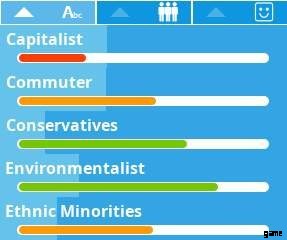
Democracy 4 の有権者グループにとって重要な概念の 1 つは、彼らの幸福は理論的なものであることを理解することです。言い換えれば、社会主義者が政府に 87% 満足しているとしても、そのグループの全員がその意見を持っているわけではありません。社会主義者は (理論的には) 有権者の 100% を占めることができ、100% 幸せになることができ、ゼロ票を獲得することもできます。どのように?個々の社会主義者は他の有権者グループに属しているため..
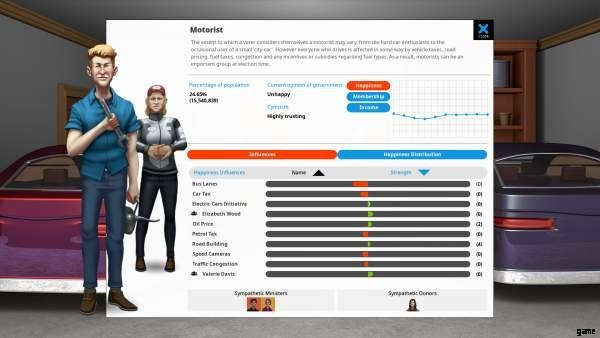
彼らは、人生の他のすべての側面 (自由主義、自動車運転、子育て、愛国心など) に不満を持っているかもしれません。この場合、彼らはあなたに反対票を投じる可能性があります。 「私は社会主義者として現政権を愛しているが、全体像を考えると、彼らに投票することはできない」と自分に言い聞かせているかもしれません。これは有権者を獲得するための重要な概念であり、1 つの有権者グループを選んで彼らを満足させるだけでは十分ではありません。
シニシズム
各有権者グループは独自のレベルの皮肉を維持しており、これはそれらの有権者があなたについてどのように感じるかに悪影響を及ぼします.シニシズムは、選挙の直前に有権者にアピールする、または選挙の直後に有権者を動揺させる政策変更を行うことによって引き起こされます。また、ポリシーが実装された後、すぐに元に戻される「フリップフロップ」ポリシーの変更によっても発生します。シニシズムはやがて消え去り、忘れ去られます。これは有権者グループごとであるため、社会主義者はあなたに皮肉を言うかもしれませんが、他のグループはそうではないことに注意してください.有権者グループの詳細画面でシニシズムを効果として表示したり、投票画面にリストされていることを確認したりできます。
自己満足
有権者グループは皮肉だけでなく、政府の自己満足も追跡しています。これは権力を維持するための重要な概念です。有権者は一般的に恩知らずの集まりであり、政府を支持することになると、「最近私のために何をしたの?」という態度を取ります。実際には、最初は満足していた有権者グループは、時間が経つにつれて、彼らを喜ばせる政策を当然のこととして採用し始めます。これは、そのグループの詳細画面や投票画面に自己満足として表示されます。そのグループからのサポートが十分に低下した場合、自己満足のレベルは再び低下します。漸進的な期間にわたって、認識される自己満足の最大レベルが増加するため、選挙で勝利するたびに、コアサポーターからさらに多くの自己満足に直面し、最終的に彼らを喜ばせるのが非常に困難になる可能性があります.
会員の変更
投票者は、時間の経過とともにグループのメンバーシップを変更できます。有権者がグループに共感する程度は、ポリシーやイベントの結果として減少し、最終的に特定のレベルを下回ると、そのグループのメンバーではなくなります。たとえば、運転者に対するポリシーが特に否定的である場合、「境界線」の運転者だった人々は最終的に自分の車を売却します。グラフの「メンバーシップ」タブをクリックすると、有権者グループの詳細画面でグループ メンバーシップに対するポリシーやその他の要因の影響を確認できます。これは、現在の影響と、それが時間の経過とともにどのように変化したかを示しています。
フォーカス グループ
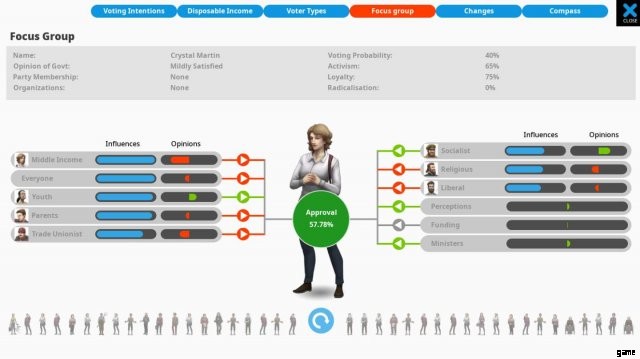
フォーカス グループは、有権者がどのように意思決定を行うかを理解するのに最適です。世論調査画面のグローバル フォーカス グループで、社会の断面をランダムに見ることができます。フォーカス グループの各メンバーをクリックすると、その有権者に関する情報と、その有権者が所属する有権者グループ (各グループとの同一性を示すバーが表示されます) と、メンバーシップが最終決定に及ぼす現在の影響が表示されます。権利。彼らが政府をどれだけ好きか嫌いかは、強制投票が実施されていない限り、必ずしも投票日に投票するとは限らないことに注意してください。
影響:原因と結果
Democracy 4 のオブジェクト アイコン間のリンクは、影響の形をとります。インフルエンスは、メイン画面ではオブジェクトをつなぐアニメーションの矢印として表示され、特定のオブジェクトの詳細画面では情報ストリップとして表示されます。たとえば、GDP の画面には、GDP に影響を与えるすべてのオブジェクトが表示されます。このオブジェクト アイコンに入るものは GDP レベルの原因であり、出て行くものは他のオブジェクトに対する GDP の影響を示します。これらのストリップは、原因と結果の基本的な強さ以上のものを示しています。
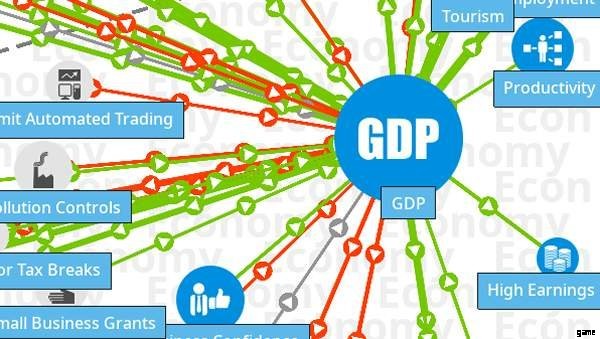
まず、原因と結果は正または負の場合があります (つまり、値を上げたり [これが望ましい場合とそうでない場合があります]、または値を下げたりする可能性があります)。それらは、Democracy 4 が「惰性」と呼んでいる、即時または時間の経過とともに影響を与えることもできます。 Effectively, this means the influence that gets applied is not taking the current value of the source object, but the average over a certain number of turns.
A good example is pollution controls and the environment. If you look at this influence as a ’cause’ for the environment, after you have made changes to the policy (Pollution controls) you can see that the effect is gradually moving from its original position to its final position, as shown by a lighter-colored bar. Most effects are actually instant, and have 0 inertia, but some have a huge amount of it. In practice, this means that you need to plan ahead, and also be aware that you are never simply looking at the outcome of your current policy decisions, there will very often be some inertia or ‘lag’ in the effects of your actions.
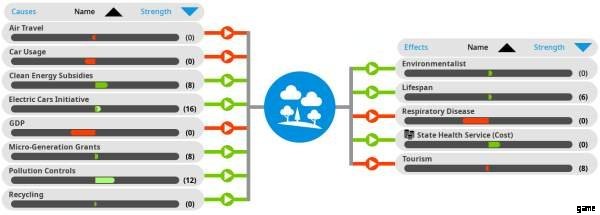
Policies
Policies are your key weapon in conquering the political landscape. In Democracy 4, a policy can also be a law, such as pollution regulation. Policies are in place when you start your first term in government, but you can cancel existing ones and/or introduce new ones. There are some policies (mostly laws) which cannot be cancelled in the conventional sense, but you are required to take a position on them, such as the abortion issue.
Policies may have just a few effects, or dozens of them. Initially, some policy effects will be hidden until a situation is triggered and they become apparent.
Policies are split into different areas of government such as ‘transport’ and ‘tax’. These areas are key to understanding the layout of the main screen of the game, as each area is a different zone on the main screen background. All of the data regarding tax is in the tax area, for example, and this includes not just policies, but also statistics and situations. Policy icons are grey in color.
Policy Sliders

As well as being active or inactive, policies are controlled by an intensity slider. This slider is the strength with which the policy is implemented. For laws, it might represent the severity of the penalty, or the effort put into prosecution. For government spending projects it will represent the amount of coverage and money spent. In many cases, the cost, or income derived from a policy will be strongly linked to the intensity slider. The most obvious example is the tax rate for a tax policy.
Implementation
Some policies are technically very simple to implement, such as most new taxes. These can take effect almost immediately. Other policies may take a number of terms to fully implement, such as building new rail infrastructure or a space program. The policy details screen shows the extent to which a new policy has been implemented. Obviously the effects of a policy are scaled to reflect this, although the full cost will have to be paid.

Implementation is important because in many cases you will have to think far in advance when committing to long term policies such as science spending or many education policies. In addition to having an effect on the time to implement a new policy, this implementation delay also affects changes to a policy slider. So for example, if you have a very weak military, and move the slider to the right for full intensity, new tanks and soldiers will not appear overnight. Instead, the slider will gradually move towards its intended position over time, as changes are made.
You can see the final target position of a policy by the slightly transparent ‘ghost’ slider on the policy details screen. If you change your mind, you can edit the position of a slider.
Popularity
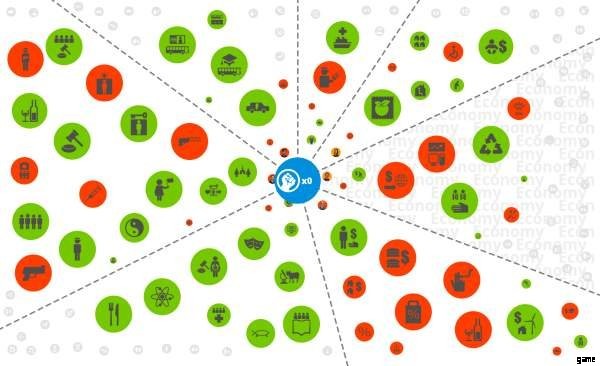
You can keep an eye on the popularity of a policy either from the policy details screen, or by selecting popularity from the main screen to view policies as green or red icons. This figure can be a bit misleading, because it represents people who have a noticeable negative or positive feeling about a policy. In many cases, the majority of voters will not really care one way or the other. In addition, some policies are expected to be unpopular, but they may be necessary to achieve other goals, or to raise government income. For example, the vast majority of taxes are unpopular with almost everybody, except some redistributive or ecological taxes which will please some voters. This does not automatically mean those policies should be cancelled.
Policy Finances
The income or cost of a policy is set by the slider for that policy, but there are also many other factors. Each policy is implemented by the minister for that department, and their effectiveness in their role will have some impact. A very poor Chancellor will result in less tax being raised. A very good minister of foreign affairs will be able to keep military costs under control.
Addition, external factors will sometimes directly affect the cost or income of a policy. For example, if you have a state health service, and a problem with infectious disease or asthma, this will push up the cost of this policy. Taxes on certain activities will be affected by their popularity. As a result it is possible (for example) to raise alcohol tax but actually bring in less money, if the tax has the effect of reducing alcohol consumption enough to offset the higher tax rate.
Political Capital
New policies can be implemented whenever you like, but introducing a new policy will cost ‘political capital’. This is a representation of the political effort required to change, cancel or introduce a new policy, and is a measure of the political difficulty associated with an action. Non-controversial policy changes, such as a boost to spending on community policing, may use very little political capital, whereas introducing conscription or the death penalty will require vast amounts. You can see how much political capital you have by clicking the icon in the center of the main screen.
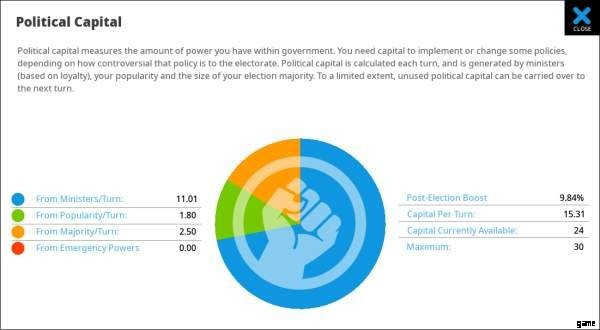
Political capital is generated each turn, based on your popularity, your electoral majority, the loyalty of your ministers, and whether or not emergency powers are in effect in a crisis. You also get a slight boost at the start of a new term. Political capital always seems to be in short supply, so make sure you spend it wisely on the most important policy changes.
Policy Icons
Policy Icons on the main screen have a circular outline with segments that illustrate if a policy slider can currently be increased or decreased, given the amount of political capital available. The amount required is split into segments for +10%, +25% or more in a clockwise direction, and in the anti-clockwise direction for policy reductions. You can turn this off under options.
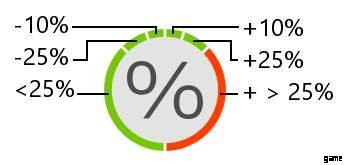
Statistics
As well as policies, you will need to keep an eye on the statistics which indicate how things are going in your country, such as the unemployment rate, health and education indices, and the vitally important GDP (Gross Domestic Product). You will find icons for the statistics scattered on the main screen in the appropriate policy area for each one, so GDP is with the economy, health is with public services and so on.
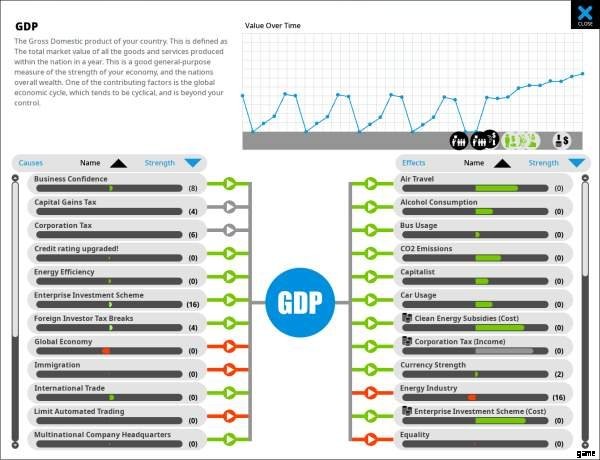
Statistics icons are always blue. These statistics act in some ways like policies, because they too can affects other items. Remember that in Democracy 4, almost anything can affect almost anything. A good example is GDP, which has a vast list of inputs and outputs. It’s affected mostly by policies, and some of the more common effects it has are on the costs of other policies, and the income derived from taxes which depend on economic activity.
Note that you cannot make any changes or have any real impact on statistics directly, all you can do is make policy decisions that hopefully push those statistics in the right direction. Voters are aware of these statistics too. Rising inequality will upset some, and rising unemployment or CO2 emissions will upset others. Statistics are so important that a selection of them is always displayed prominently on your quarterly report.
Situations
Situations are shown on the main screen, either as red or green icons. Red is generally a bad situation, and green is generally good. Situations are on-going events that have been triggered by a certain combination of policies and statistics. You *may* get a warning that a situation is about to trigger before it does. Once triggered a detailed screen for each active situation will let you see how strongly it is active, and what is causing it, as well as its effects on other items.
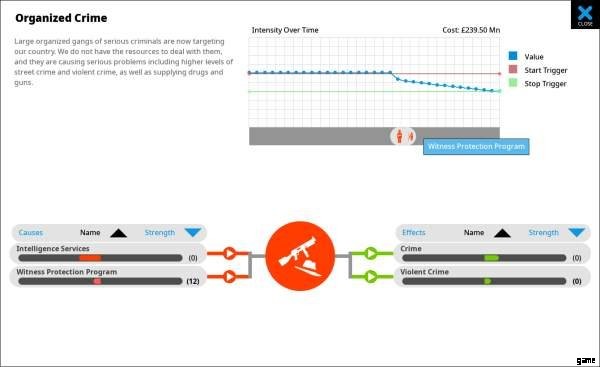
In most cases, situations have a ‘start’ trigger and a ‘stop’ trigger point. In general, this means that it is easier to start a situation than end it. For example, if your policies have led to race riots, then stopping the riots will require a much stronger policy response than would have been required to just prevent them starting in the first place. This is because situations have momentum.
In general, it’s a good bet to think about potential bad side effects of policies *before* a bad situation develops. Note that situations can affect other situations too, potentially leading to a general downturn in the country.
Events
From time to time, events will take place which impact your country. Very few of these events are truly random, although they may be affected by a slight random input. For example, if you cut funding to the military this may lead, over time, to military action against your country, or to a military whistle-blower criticizing your government.
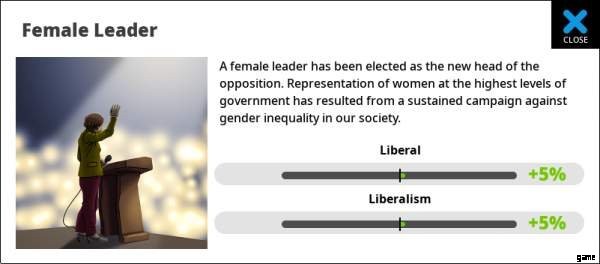
Events are one-off occurrences that generally have short term effects, but if those effects are negative and badly timed (just before an election, for example), they can be devastating. You hear about events on the quarterly report screen, and they are not shown anywhere else, although you may see the lingering impact of events as effects on any of the other screens in the game. Those effects usually die out gradually over time. Be aware that not all events are bad. Some are a reflection of good economic policy, or wide-spread provision of social services or prosperity.
Dilemmas
Although in general you get to decide when policy decisions are made, occasionally issues become time sensitive or the debate in the country reaches a point where a decision has to be made one way or another on a topic. When this happens, you will get a dilemma on the quarterly report screen. There will be a handful of options and you have to choose one before the turn ends.
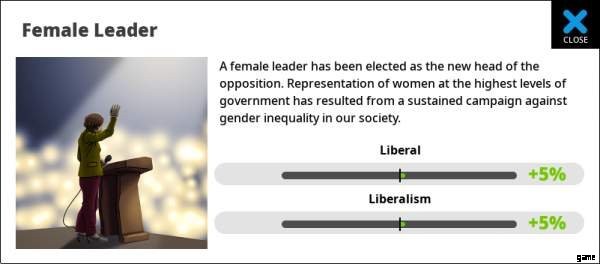
Each option may have a variety of short and long term effects on voters, statistics, situations and so-on. You are not able to proceed to the next turn until outstanding dilemmas have been dealt with. There is no other place where you will see the dilemmas, although you may be able to see the effects of your decisions as inputs to items on their various details screens.
Elections &Parties
Each country has its own electoral term length, so the number of years you have to sort out a country’s problems before re-election is dependent on the country you are governing. Note that Democracy 4 enforces fixed terms for all countries. You cannot call a sudden election. In addition, the number of terms is limited to the actual term limit for each country. However before playing you can override both of the term length and number of terms, and play endlessly if you want to.
Elections can be tense because they are one of only two ways you can lose the game (the other by being assassinated). Once an election is over, you can see what percentage of each voter group turned out to vote, and what percentage of voters cast their vote for you.
Political Parties
There are either two or three parties in Democracy 4, depending on the country. You can choose a party name at the start, or you can type in your own name. You can also choose the name of your opponent, although this has no impact on them. Democracy 4 is not concerned with the policies or views of the opposition, who are assumed to oppose everything that you do. If a voter is happy with you, they vote for you. If they are not happy with you, they vote for the opposition.
As well as being a target for votes, parties are also represented within the game. Each voter can be a non-party member or a party member. Party members may or may not be activists. Most people do not join either party. If they become very happy with your government, over time they may decide to join your party. All this really means is that they are guaranteed to turn out and vote on Election Day, regardless of how strongly they feel. They are also guaranteed to vote for you. If they become even happier with your government, they may over time sign up as an activist. If voters view you negatively they may join the opposition party. You can see the values for members and activists on the party screen. You can launch this screen from the rosette button near the top right of the main screen.
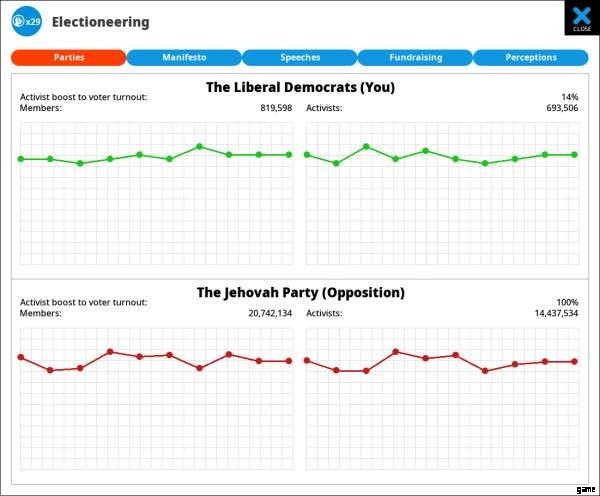
Activists are special because they proactively go out and post leaflets, wear badges and put up signs. This has no effect on how people feel about your government at all, but it *can* boost turnout during the election. In close elections, the final victory may go to the party that boosts turnout the most. In countries where voting is compulsory, this is never an issue.
Turnout is also affected by strength of feeling. Voters who are happy will turn out on election day and vote for you. Voters who are very unhappy will turn out to try and kick you out, but voters in the middle with no strong feelings either way are likely to just not bother. This is political apathy, and is slightly different for each country (based on real-world voter turnout). You can adjust voter apathy to increase or decrease base voter turnout from the customize game screen before you start. In general, you will find that a middle-of-the-road compromise government will result in low turnout, and a hard-liner transformative and divisive government will result in very high turnout.
Terrorism
Like all governments, there is a potential threat from terrorists and assassins, unhappy with the way you are running the country. A strong military and other surveillance and intelligence policies will reduce the likelihood of a successful terrorist attack. The security screen displays a list of known terrorist organizations alongside pressure groups and other harmless organizations.
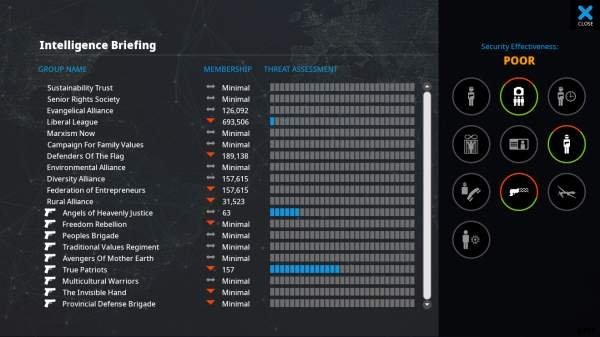
All terrorist groups draw their support from the membership of existing pressure groups and organizations. For example, if government policy particularly upsets patriots, some of them may join a patriotic pressure group to vent their anger at the government. If the anti-patriot policies persist, particularly angry members of those groups may, over time, become ‘radicalized’ enough to join a dangerous terrorist organization. At this point, their growing membership will pose a serious threat to you, although you are likely to be warned of a plot before any serious attack.
The attacks may or may not succeed depending partly upon luck and partly upon the defensive mechanisms of the state such as wiretapping and intelligence services. Note that the process of radicalization varies with the temperament of the individual and the group involved. It is also a reversible process, although this will take time.
There is also an extent to which placating and pleasing the basic voter group from whom terrorists are drawn will reduce the probability of attack, so if you have a large and dangerous group of religious terrorists, you can reduce an imminent threat by changing policies to please the religious voter group. Also, note that terrorists are actual voters drawn from voter groups, so reducing the number of socialists will reduce the pool of potential recruits to both socialist pressure groups and socialist terrorist organizations.
Cabinet Government
Although you are president (or prime minister) you do not exert unchecked control over the country. You have a cabinet of ministers with responsibilities for different areas of policy. These ministers are important in 3 different ways. They generate political capital which allows you to change policies, they affect the success of policies within their department, and they also provide electoral benefits to specific voter groups.
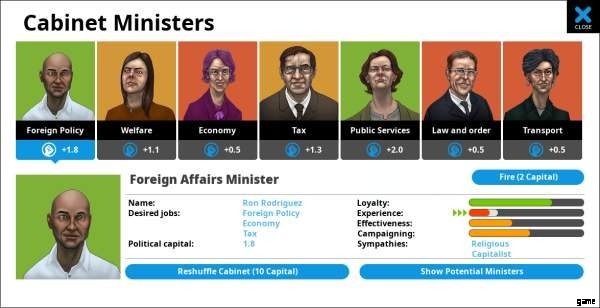
Political Capital
Ministers generate political capital each turn. Some of them are more influential and powerful than others, and thus will generate a larger amount. This enables you to get more legislation passed. The amount of capital they generate is dependent upon their loyalty. A minister’s loyalty may go up or down over time, depending how you run the government. There is also a general inevitable downward trend of loyalty as a minister becomes more jaded and cynical with the government. It’s best to replace people before they get too disloyal. Ministers can resign, (although rarely without warning) and resignations are unpopular.
Minister Effectiveness
Ministers also have a rate of ‘effectiveness’. This is essentially a measure of how good they are at their job. The longer they stay in cabinet, the more experienced and effective they become. Effectiveness is also determined by their natural disposition towards certain jobs. Each minister has a few jobs they would especially like, and these are the ones in which they would be most effective. The effectiveness of a minister is important because it determines the cost of (or income from) policies. It also affects the implementation rate or change-rate of existing policies. Simply put, an experienced and effective minister in the right job will get more done for less, and faster.
Voter Effects
Ministers are not any different from voters, in that they have certain allegiances and attributes. Because of this, they will appeal to, and identify with, specific sets of voters who they are described as having ‘sympathy’ with. This is an effect that cuts both ways. For example, a specific minister may be a commuters champion and very religious. Having them in government will please both of these voter groups, regardless of policies, because they see ‘someone like them’ in government, and feel that they must be acting in their best interests. Obviously this is a good thing, if you need support from those groups.
On the other hand, A minister’s happiness is directly affected by the happiness of those sympathetic voter groups. So, in our example, a government that angers commuters and religious people is going to upset the minister, which will reduce his or her loyalty. The minister will work less effectively to implement your policy decisions, or support you in introducing new policies. Because of this two-way effect, you may find selecting a minister to fill a vacant post a tricky business.
Reshuffles &Firings
From time to time ministers resign, which is bad for the government, but you can fire and hire replacements whenever you wish. Remember that experienced ministers are more effective so be careful. If you want to move ministers around without firing them (fired ministers are gone for good), you can call a reshuffle, which has none of the bad PR effects of mass firings.
Finances
One of the hardest jobs in government is going to be keeping an eye on the budget. All the countries in Democracy 4 start off with a government debt. There is no rule that says you ever have to pay off this debt, and as long as you can afford to pay interest on the debt, you may do okay. However, interest payable on the debt can change dramatically. If global interest rates fluctuate, or concerns are raised about your government’s stability and ability to pay back its debts, your credit rating could be altered. If the global markets decide to rate your debt up or down you will hear about it in your quarterly reports.
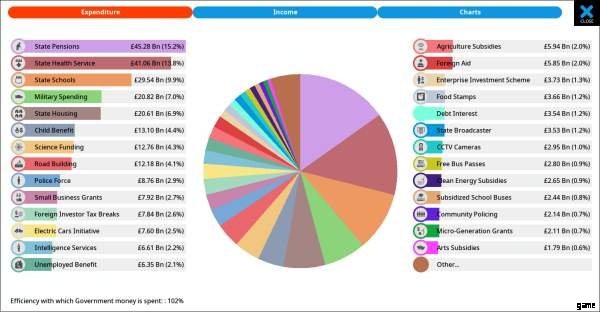
The moment there is a change in your country’s credit rating, there will be a noticeable change in interest rates. This can escalate very quickly and suddenly so it is worth keeping an eye on. One of the key factors used by the market to determine your credit rating is your debt to GDP ratio. If your economy is doing well and your GDP is high, this will keep interest rates low and you can get away with a higher level of debt than if GDP is low.
Global Economy
There is a whole global economy out there, and this will have an impact on the way you run the country. Over time, the global economy will generally go through a boom and bust cycle, and this will affect your own economy. It will especially affect tourism. The global economy may also be susceptible to sudden market changes, which are outside your control. You can monitor the global economy on the finance screen.
Coalitions
In some countries, there are three political parties instead of two. In that case, it is possible for you to be the largest political party at election time, but not have a majority of the votes cast. If this happens, you get to run the country in coalition with the next largest party. This will reduce the amount of political capital you have when governing.
When in a coalition, you will sometimes get offered a deal by your coalition partner, where they ask you to implement one of their policies, in exchange for more political capital. It’s entirely up to you if you take that deal, but be aware that the electorate will hold you responsible for all your actions, even if it was a coalition partner’s idea.
Electioneering
As well as governing the country, you also have to support your party. The electioneering screen is launched from the rosette icon near the top right of the screen. From here you can monitor all the efforts your party is making to win the next election, such as recruiting members, committing to a manifesto, giving speeches, fundraising and improving the voter’s perception of you and your party.
Speeches and manifesto pledges can only be made very shortly before an election takes place. Manifesto pledges are effectively free promises, but failing to keep them if you are re-elected can prove unpopular the next time you ask for peoples’ votes. Speeches are a way to trade-off support from one group of voters to another, depending how important they are to your campaign.
Fundraising
The fundraising screen shows you how much money your party has raised for the election, compared to other parties. Money comes from individual member’s donations, plus some large donations from wealthy individuals. The wealthy donors will have their own ideas concerning policy, and you may occasionally be asked to implement policies in exchange for their continued support
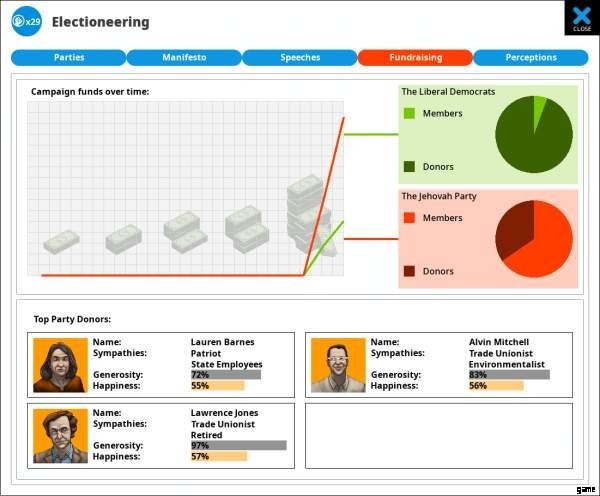
The amount of money you have at the election will be a factor in determining how well your campaign goes, and how likely your supporters are to actually turn out and vote. The campaigning skill of each of your ministers will also have an impact. It might make sense to replace disloyal ministers for ones who are better at campaigning as you get close to an election.
Perceptions
As well as your policies, voters form opinions on you based on their perceptions of your personality. You can improve their perceptions by taking part in media events that are designed to change the way the voters see you. This can be an easy way to get support, but carries risks. Some media events can backfire and have the opposite effect, actually reducing your chances of re-election.

